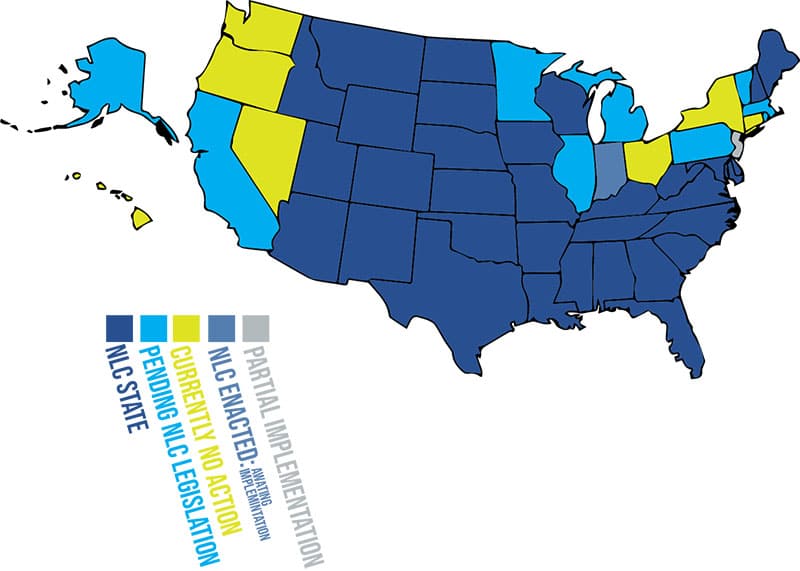Hand Hygiene: Shocking Statistics & How To Take Care of Your Hands
We’ve done the math on how many times nurses perform hand hygiene, plus some shocking facts and a few tips on how to take care of your hands as a nurse.
Our relentless research goes beyond shoes. Capsol allows us to talk all things nursing, from career advice and current news to self-care and mental health. These conversations with you, the community, and the world at large help us put our best foot forward when creating the best nursing shoes on the planet.

One of the great attributes of being a Nurse is that you can live anywhere in the country and there will be a place for you to work. Wouldn’t it be great if you could move wherever you wanted without having to google which states are compact states? Or having to worry about submitting money, paperwork, and fingerprints to reapply for your license? States are slowly, but surely moving toward streamlining their licenses, and here is a quick update on the future of compact states.
Compact states are a group of states that have joined the Nurse Licensure Compact which enables the state to honor any license from any state that is also in the NLC. For instance, a Florida licensed nurse can practice in Georgia because they are both compact states. These states all endorse each other’s licenses, making nursing practice more fluid.

Alabama
Arizona
Arkansas
Colorado
Delaware
Florida
Georgia
Idaho
Iowa
Kansas
Kentucky
Maine
Maryland
Mississippi
Missouri
Montana
Nebraska
New Hampshire
New Mexico
North Carolina
South Carolina
North Dakota
Oklahoma
South Dakota
Tennessee
Texas
Utah
Virginia
West Virginia
Wisconsin
Wyoming
There are some other states attempting to implement legislation in order to join the NLC. Current states that have proposed legislature are:
● California
● Alaska
● Illinois
● Minnesota
● Pennsylvania
● Vermont
● Massachusetts
Indiana has already passed a legislature that is just waiting for implementation. If all of these states pass, that would bring the total to 40 compact states out of 50 total states.
States that are not in the compact state must apply for licensure by endorsement in the new state which ultimately racks up new fees and extra time. You would then essentially have only a single state license or two single state licenses depending on whether you moved from a compact state or not. Have more questions? The NCSBN provides some different moving scenarios here.
● More mobile nurse practicing: Travel nursing, which currently is a big help to the staffing shortage that we all experience would be able to grow ten-fold if every state was under one compact licensure. We would finally have help!
● Prevent maldistribution of licensed nurses: With each state having different licensure requirements, there tends to be a concentration of nurses in states that are “easier” to get licensed in.
● Useful for nurses that live on borders: Many nurses who live on the borders of different states would have a lot more opportunity to provide patient care. Additionally, the care facilities that are located on borders would have greater employment selection which would decrease staffing shortages.
● Less boundary definition: If we focus more on boundaries for licensure, there is less attention to patient needs. However, less focus on boundaries increases the attention to patient needs.
● Virtual care might need more compact licensure in the future: With a big push towards virtual care, the demand for registered nurses, and therefore compact licensure, would be increasingly necessary in the future.
● Would standardize care: There are currently different requirements between compact and non-compact states for licensure so ultimately, every state becoming a part of the NLC would help standardize the level of care nurses provide.
Most of the states have adapted their licensure requirements to allow for additional access to nurses despite geographical borders. Some states were more lenient than others. Check out the temporary licensure requirements of your state
Even though states are allowing nurses with different licenses to practice, COVID didn’t change the initial licensing requirements.
Compact states might just be the future of nursing. Do you live in a compact state? Do you think there are any disadvantages to having standard licensure like the NLC? Let’s talk about it!
References:
https://www.ncsbn.org/NLC_Fast_Facts.pdf
https://www.ncsbn.org/2018_Moving_Scenarios_Factsheet.pdf
Author
most recent
We’ve done the math on how many times nurses perform hand hygiene, plus some shocking facts and a few tips on how to take care of your hands as a nurse.
Celebrate Pediatric Nurses Week as we talk about what pediatric nurses do, ideas for showing appreciation, and a breakdown of how to become one. Don’t miss this!
Ever wonder, what is with nurses and coffee? I mean, why do nurses love coffee? So many of us depend on that rich, hot java to jumpstart a shift.
0 Comments